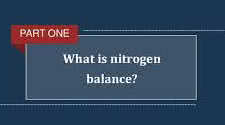Positive Nitrogen Balance Definition - Occur in the Body When?

Keep your Body, Mind and Health in Constant Tune
Nitrogen is a chemical element contained in all plant and animal tissues, and humans get it via protein foods. A hundred grams (g) of protein contains approximately 16 g of nitrogen. Measuring
nitrogen intake against excretion (in urine, for example) can be used to determine protein utilization. Humans can be in neutral, negative or positive nitrogen balance, though in normal adults,
intake usually equals output - this state of equilibrium is known simply as nitrogen balance.
Negative nitrogen balance can occur under conditions such as starvation, surge 17, shock or other traumatic events - including hard training and low dietary intake of protein and calories - that
lead to body protein being broken down taster than it is replenished. Protein is used by the body in several ways throughout the day, for tasks such as building and maintaining tissue, or even
for energy if not provided in sufficient quantity by other foods. If protein isn't replaced as it's used up, negative nitrogen balance occurs.
On the flip side, positive nitrogen balance occurs when nitrogen intake exceeds 1 excretion. This condition signals that new tissue is being built, such as in pregnancy, recovery from serious
illness or growth - which is the condition sought by bodybuilders.
To accurately determine what state you're in, you'd have to undergo medical testing over several day$. Until a more convenient testing method becomes accessible, an individual can use formulas
derived through studies to remain in positive nitrogen balance. The minimum amount of protein required to sustain daily activities, as determined by the National Academy of Sciences, is 0.8 g
of protein per kilogram (or approximately .36 g per pound) of bodyweight. However, a bodybuilder's protein requirements increase to at least one gram per pound of bodyweight in order to cover
the demands of intense training, vigorous activity and other stresses. This amount of protein helps create a positive nitrogen balance, allowing a bodybuilder to continue to make muscular gains.
Remember that protein consumption will contribute to positive nitrogen balance only if your total daily caloric intake is sufficient. If you're not eating enough, especially carbohydrates, then
your body will use anything you eat to fuel its activity. Hence, if you start cutting carbs and calories, you often need to increase your protein even further in order to provide fuel that was
previously supplied by carbs.
The most efficient way t to achieve positive nitrogen balance is by eating adequate amounts of high quality complete proteins such as eggs, dairy and meat products. A "complete" protein contains
sufficient amounts of all essential amino acids - these are the aminos your body can't produce on its own. Eggs are commonly used as a "reference protein" because their amino acid profile is
complete and strong. Most other complete proteins aren't strong in every amino - for example, beef isn't a major source of valine.
When you eat non-animal sources of protein such as bread or cereal, try to combine them with milk, cheese, etc., for a complete combination ( a complete combination provides efficacious levels of
all essential aminos). Or choose vegetarian combinations such as beans and rice that, together, provide all of these essential amino acids.